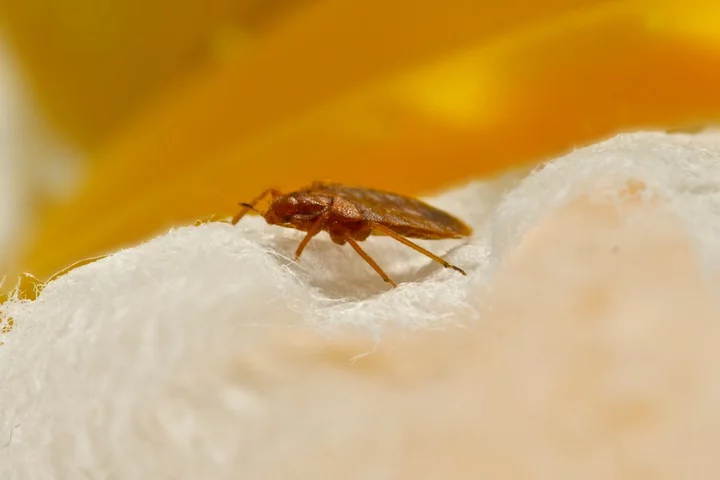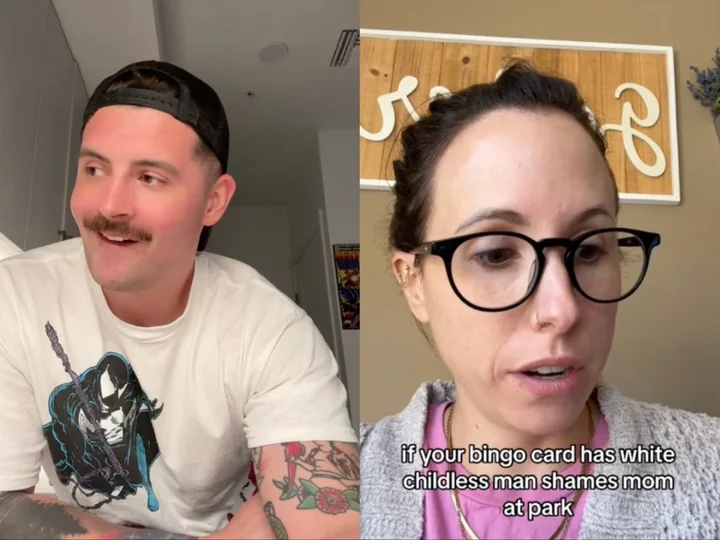
MLB Rumors: Adam Wainwright shocking injury reveal finally explains Cardinals 2023 struggles
Adam Wainwright had a difficult final season, but his latest revelation may explain why he struggled so badly.
1970-01-01 08:00

NBA In-Season Tournament prize pool: How much do the winners get?
As the first NBA In-Season Tournament nears, fans are wondering how much the players will get in prize money if they win the tournament.
1970-01-01 08:00

Having an overweight pet could cost owners over £1,000 in vets’ bills
Having an overweight pet could cost owners £1,500 in vets’ bills per visit, claims data has revealed. Common health problems caused by excessive weight include cruciate ligament injuries, urinary tract disease, diabetes and arthritis. Addressing cruciate ligament injuries can mean swallowing a whopping bill of £1,578.28, and urinary tract disease costs for cats are skyrocketing to a jaw-dropping £752.06. Data from pet insurer ManyPets shows, on average, pet owners are forking out £682.65 for a trip to the vets for diabetes, while arthritis costs are coming to £476.61. However, 51 per cent of cat and dog owners are already concerned about their pets’ weight, a separate poll of 2,000 pet owners found. And nearly one in five (18 per cent) with a cat or dog could encounter these bills soon as they believe their pet already is carrying more weight than it should. With almost a fifth (19 per cent) admitting they are already shelling out more to tackle their pets’ fluctuating size. The research was commissioned as part of the ManyPets ‘Why Weight?’ report and launch of its Obesity Learning Hub. Steven Mendel, chief executive and co-founder of the pet insurer, said: “We understand it can be difficult to resist rewarding pets with extra treats, and heart-breaking to say no to them when they’re asking for more food. “But, with obesity associated health problems becoming more and more prevalent, we urge pet parents to think twice to save their pets. “We’re proud to have launched our Obesity Learning Hub to offer tips and veterinary approved advice for pet parents everywhere.” The research went on to find, with the rising cost of living still looming large for many pet owners, 22 per cent have been forced to make cutbacks to their pet’s lifestyle. Almost half (49 per cent) of these are now opting for lower quality brands of food, and 37 per cent have reduced their spend on healthcare. But 88 per cent believe they would be able to recognise the signs a pet is potentially getting to an unhealthy weight, yet only 31 per cent regularly keep an eye on their pet’s weight. Moreover,39 per cent will only visit the vets in an emergency – all of which point to an increase in weight going unchecked. In a bid to help keep weight down, 76 per cent do try to keep their four-legged friends as active as possible, while 75 per cent limit the number of treats or table scraps they give out. The study, carried out via OnePoll, found of those with an overweight pet, 22 per cent feel as if their cat or dog is ‘always hungry’. While a puzzled 19 per cent scratch their heads over their pet’s weight as they don’t think they eat an excessive amount. Steven Mendel added: “While many pet owners believe it should be straightforward to spot if their cat or dog is putting on weight – it’s often easier said than done. “In most cases, gaining weight is very gradual, meaning it can be trickier to identify - especially if pets are not attending the vet regularly. “We’re hopeful that with the right course of action and identifying the signs early, longer term pet health problems can be avoided in the future.” Read More Cat owner reunited with pet Tux after emotional Lyft ride saga Dogs’ facial markings could play a role in how close they are with owners Moment cat stuck inside boat’s hull after fire is rescued by firefighters Cat owner reunited with pet Tux after leaving her in a Lyft What you need to know about depression during menopause – as Carol Vorderman opens up Linda Evangelista describes relationship with Gerald Marie as a ‘MeToo marriage’
1970-01-01 08:00

What you need to know about depression during menopause – as Carol Vorderman opens up
Carol Vorderman has opened up about the “really black” thoughts she experienced during menopause. The former Countdown host, 62, admitted she had struggled with “severe depression” – despite there being “nothing wrong” in her life. “When I went through it, I had severe depression for about six months. I think it was 2015. There was nothing wrong in my life, I had made a lot of money, my kids were fine, my mum was fine,” Vorderman said, speaking on the Postcards From Midlife podcast, hosted by Lorraine Candy and Trish Halpin, this week. “Yet I would wake up in this huge bed in this huge house, I’ve got a swimming pool outside and all of that, and I just thought, ‘What’s the point?'” She added that she understands “much more now clinical depression, where you go, ‘I can’t go through this again, how can I make this stop’, and those thoughts of, ‘Well, there is obviously one way to make this stop’.” Vorderman had previously opened up about her menopause experiences during an appearance on ITV’s This Morning last year – where she revealed she had started found “bespoke HRT” helpful for managing her symptoms. By speaking out, the broadcaster and author has shone a light on the ways menopause can impact mental health. So, why does this happen, and what do people need to know? “Women may become depressed in menopause due to the change in hormonal balance. Low mood, depressive symptoms and anxiety are often the first symptoms of perimenopause,” said intimate health expert Dr Shirin Lakhani of Elite Aesthetics, who is set to be a speaker at Pause Live! 2023, a menopause event taking place in London in November. “The symptoms of perimenopause and menopause in themselves can trigger mental health problems and cause women to become depressed,” Lakhani added. This can manifest in a wide range of ways. It could be linked with the impact menopause symptoms have on somebody’s work life and relationship for example, or due to physiological changes people are dealing with. “The lack of awareness regarding menopausal symptomatology may result in needless anxiety for patients and a feeling of helplessness. Early symptoms also include difficulty concentrating, often known as brain fog. Many women also experience relationship difficulties due to the perimenopause and menopause, whole family dynamics can change, as partners and family members do not know how to support women,” said Lakhani. “A lot of women I speak to have no idea what is going on and feel they are going completely crazy. Even if it’s just having someone to listen to and acknowledge something is going on [can be] very helpful, and once they are on hormones (HRT), they often feel like they have got themselves back again.” Keep an eye out for symptoms It’s important to note that not everybody’s experience is the same, and some people do not experience severe symptoms during menopause. However, Lakhani added that “the link between menopause and poor mental health must be reviewed”, and some people may experience “thoughts of suicide”. Lakhani continued: “If you already have a pre-existing mental health condition, it is also possible that the symptoms of menopause will cause a relapse or change to your mental health too, so people need to be aware of this.” Can you protect yourself from menopausal depression? While there are common symptoms that apply to menopause, exactly how it will impact each individual can be unpredictable too. Knowledge and awareness of what’s going on is a helpful starting point. Generally speaking, Lakhani said there are measures people can take to help manage menopause. But the most important thing if you are struggling with your mental health for any reason is to seek support. “Certain lifestyle factors can affect how you feel during the menopause. Don’t smoke and try to limit alcohol, get plenty of rest by keeping to regular sleep routines, even if you struggle to sleep. Eat a healthy diet and try to eat foods with a lot of calcium, such as kale or broccoli to keep bones healthy,” suggested Lakhani. “If you are struggling with your mental health during menopause, I would recommend going to your GP or considering counselling.” Read More Charity boss speaks out over ‘traumatic’ encounter with royal aide Ukraine war’s heaviest fight rages in east - follow live Autumn pests to look out for and how to get rid of them in your home and garden How can I tell if my child has ADHD? Why hasn’t my apple tree produced much fruit this year?
1970-01-01 08:00

Linda Evangelista describes relationship with ex-husband Gerald Marie as a ‘MeToo marriage’
Linda Evangelista has described her relationship with ex-husband Gerald Marie as a “MeToo marriage”, in the first episode of Kirsty Young’s new podcast. On Young Again, the BBC broadcaster interviews a number of famous figures about what they would tell their younger selves if given the opportunity. Evangelista reflected on her 40-year career as one of the first international supermodels, her upbringing, and her regret at not speaking about her abusive marriage sooner. The 58-year-old was married to Marie, the former head of the European division of Elite Models, from 1987 until 1993. “Did I have #MeToo moments? Absolutely. I was in a #MeToo marriage. Absolutely,” she told Young. “I kept quiet for many many years. And The Guardian did a story on all the models. Only when speaking to the journalist did I find this out. And to think that I was married to him when all this was happening, is crazy. “And there’s a side of me that thinks that if I would have spoken up and said something about what was happening to me, that maybe they would have come forward at that time. And the statute of limitations wouldn’t have run out.” In 2020, seven women accused Marie of rape and sexual misconduct, which he denied. The investigation was closed without charges last month. In a recent Apple TV+ documentary, The Super Models, Evangelista described the marriage as “an abusive relationship” and claimed Marie knew not to touch her face because that was “the money-maker”. In a statement, the 73-year-old denied the abuse allegations, and said he “has never committed the slightest act of violence”. The Super Models profiled modelling stars Naomi Campbell, Evangelista, Christy Turlington and Cindy Crawford, exploring their careers as the most sought-after models in the fashion industry during the late Eighties and Nineties. Campbell, Evangelista, Turlington and Crawford, now in their fifties and with children of their own, offer a snapshot into their early careers. Each episode – “The Look,” “The Fame,” “The Power” and “The Legacy” – features archival footage from their heyday and intimate interviews with each model. The first three episodes of Young Again, the new podcast from Young, are available now on BBC Sounds. Future episodes will be broadcast weekly on BBC Radio 4 at 11am from 3 October. The national domestic abuse helpline offers support for women on 0808 2000 247, or you can visit the Refuge website. There is a dedicated men’s advice line on 0808 8010 327. Those in the US can call the domestic violence hotline on 1-800-799-SAFE (7233) Other international helplines can be found via www.befrienders.org Read More Helena Christensen says she has no interest in being in a supermodel documentary Cindy Crawford reflects on ‘traumatising’ haircut in her early career Groping, abuse and racism: 10 of the most shocking revelations from The Super Models TV show Helena Christensen says she has no interest in being in a supermodel documentary Fans convinced that Linda Evangelista and Naomi Campbell are ‘feuding’ 10 of the most shocking revelations from ‘The Super Models’ on Apple+
1970-01-01 08:00

NFL Week 5 Predictions and Picks Against the Spread: Six Best Bets
NFL Week 5 picks and predictions ATS.
1970-01-01 08:00

How to get rid of bed bugs? The signs and symptoms as infestation could make its way from Paris to London
It was a not-so glamourous end to Paris Fashion Week, as a “widespread” outbreak of bed bugs caused panic and disgust in the French capital. Paris authorities sent out a public warning that “no-one is safe”, with the small insects making their way through the city. In recent weeks and months, there have been numerous sightings on public transport and other locations. “No one is safe. You can catch them anywhere and bring them home, and not detect them in time until they have multiplied and spread,” deputy mayor Emmanuel Grégoire, told French TV. Videos posted on social media show insects crawling over seats on the Paris Metro as well as appearing in huge numbers on cinema seats. Some users have also shared their experiences of being bitten by the critters. So, how can you help protect yourself against a bedbug infestation? Here’s everything you need to know. How do you know if you have bed bugs? To find out if you have bed bugs, it’s best to keep an eye out for two things: 1. Bites on your body – these look like little red marks that cause itchy welts. “These welts usually appear in a zigzag pattern,” the American Academy of Dermatology Association says. 2. You should always keep an eye out for signs of bedbugs, this includes odour, specks of blood on bedding, exoskeletons, tiny blackish specks and eggs. • Odour: If you notice a sweet or musty smell in your sleeping area, there might be a heavy infestation in the room, the AADA says. • Specks of blood: Look at your bedding, mattress and furniture – if you notice specks of blood anywhere, the insects might have made their way into your home. • Exoskeletons: The small insects have an outer shell that they shed and leave behind. Check for remains on your bedding, mattress and cushions. • Tiny blackish specks: The blackish specks are a sign of beg bug excrement. • Eggs: “After mating, female bed bugs lay white, oval eggs in cracks and crevices,” the AADA says on its website. These will be in the size of an apple seed, so keep your eyes peeled. How do I treat bedbug bites? The NHS says bedbug bites usually clear up on their own in a week or so but there are a few steps you can take to help you during your recovery process: • Put something cool, like a clean, damp cloth on the affected area to help with the itching and to ease off any swelling. • Be sure to keep the affected area clean to prevent any further infection. • Try your best not to scratch the affected area. You can also get steroid creams like hydrocortisone cream to ease bedbug bites. However, children under 10 and women who are pregnant should get advice from a doctor before using this cream. Another option would be to use antihistamines, these may help if the bites are very itchy and you’re unable to sleep, the NHS says. How to get rid of bed bugs – the do’s and don’ts It can be hard to get rid of the small insects on your own, so you might need to contact your local council or pest control service to get rid of the pesky creatures. Here are some steps you can take to reduce bed bugs: • Remove the affected bedding and clothing – wash on a hot wash of 60c and tumble try on a hot setting for at least 30 minutes. • You can also put the infested bedding and clothing in a plastic bag and place It in your freezer for 3 to 4 days. • It’s time to up your cleaning game – “bedbugs are found in both clean and dirty places, but regular cleaning will help you spot them early,” the NHS adds. Here’s what you should avoid doing: • Do not keep clutter around your bed, try to keep your space as clean as possible. • Do not bring second-hand furniture indoors unless you have cleaned and carefully checked it. • Do not take luggage or clothing indoors without checking it properly – especially if you have come from somewhere where you know there are bedbugs. What are the causes of bedbugs and where do they live? The wingless parasitic insects are found all around the world and may be linked to, more frequent travel, changes in pest control practices and insecticide resistance. Bedbugs can be found in: • Clothing • Luggage • Bedding • Boxes • Box springs • Mattresses • Headboards • Objects near beds According to the Mayo Clinic, they can also be found: • Under peeling pain or loose wallpaper • Under carpeting near baseboards • In upholstered furniture seams • Under light switch plates or electrical outlets Can bed bugs reach the UK? The short answer is yes… Bed bugs have a lifespan of between four to six months and are known to cling onto dirty suitcases – so it is possible that they may hitch a ride on the Eurostar which is just two hours away from London. The Independent’s Barney Davis asked David Cain, founder and MD of Bed Bugs LTD and a qualified microbiologist, whether the bugs could survive the journey. “Easily, yes, without a shadow of a doubt,” he responded. Read the latest on the bed bug infestation in Paris here. Read More Is London prepared for the mutant bedbug invasion that has swarmed Paris? That will bug you: Thousands of mosquitoes take over walls of bathroom Hotel worker shares tips on how to hunt out bed bugs How can I tell if my child has ADHD? Man inundated with criticism after judging mum on her phone Brits think investing is for the super-rich, poll finds
1970-01-01 08:00

Sir Bob Geldof issues warning about new musical based on story of Live Aid: ‘It better not be s***!’
Nearly 40 years after the iconic fundraising shows, the story of Live Aid is being turned into a musical – prompting the 1985 gigs’ co-creator Sir Bob Geldof to warn it “better not be s***”.
1970-01-01 08:00

How can I tell if my child has ADHD?
ADHD awareness is on the rise – yet it can still sometimes be tricky for parents and carers to know whether their child is affected or not. It’s estimated that 5 per cent of children in the UK have ADHD, according to the charity ADHD UK. And while the condition has previously been stereotypically associated with ‘disruptive’ and ‘naughty’ behaviour, particularly in young boys, it is now understood to be far more complex and nuanced than that. “Attention deficit hyperactivity disorder, or ADHD, is a neurodevelopmental condition that impacts someone’s attention, their levels of hyperactivity and impulsivity,” explains Dr Seb Thompson, consultant clinical psychologist at Cygnet Health Care. “Typically when someone has ADHD, they tend to struggle with their attention, with hyperactivity and with impulsivity – although it is possible to just struggle with symptoms from one of those,” Thompson adds. Of course, no child has ‘perfect’ concentration all the time, and many kids can have impulsive moments or bouts of being a bit hyperactive. So, how do you know if they’re actually showing signs of ADHD? To mark October’s ADHD Awareness Month, we talked to some experts… ADHD does not always look the same There are some common patterns that crop up with ADHD, however it can also affect individuals very differently. So, if another child has similar behavioural traits to yours and has had a diagnosis, that does not necessarily mean your child has ADHD too. At the same time, children could have very different behavioural traits, yet both have ADHD. “Every child with ADHD will probably struggle with a unique set of difficulties,” explains Georgia Chronaki, senior lecturer in developmental neuroscience at University of Central Lancashire. “[For example] One child might struggle with paying attention in class, another may struggle with managing their emotions.” They find being still and quiet really hard It may be a stereotype, but uncontrollable fidgeting could be an indicator of possible ADHD. Thompson explains: “The hyperactivity and impulsivity difficulties associated with ADHD could include being unable to sit still without fidgeting, excessive restlessness, finding the quiet to be uncomfortable, difficulty engaging in tasks quietly, difficulties in turn-taking, impulsively saying or doing things without thinking through consequences, as well as a tendency not to consider the risks of behaviour.”Your child is often forgetful and loses things easilyThompson says if they are “frequently misplacing or losing items, being easily distracted, appearing to be daydreaming, and having difficulties remembering to do tasks and difficulties following through with instructions”, it may be linked with ADHD. You can tell your child is struggling If your child seems to be finding things a struggle, this could be a big indicator. “Imagine really wanting to pay attention to a conversation that is happening but your brain is not letting you,” says Thompson. “Imagine really wanting to focus on your homework, but your brain is not letting you. Imagine really wanting to sit and watch a TV programme, or sit and eat a meal, or sit and relax and your brain is not letting you. “The world can be a very frustrating place for young people with ADHD, particularly if they do not understand why their brain works in the way it does.” They seem down or depressed Thompson adds that kids with ADHD “can often suffer with low self-esteem, depression and anxiety”. He explains: “Young people who get frustrated by their difficulties may stop trying at school, or lose interest in their hobbies because they can’t sustain the attention to take part.” Seeking advice If any of these things are impacting your child’s wellbeing and making things seem hard for them, or if you are concerned they may have ADHD, then it may be worth seeking professional support. Diagnoses are typically given by specialist ADHD assessment teams, and referrals tend to be made via schools or Child and Adolescent Mental Health Services (CAMHS). Read More ‘I think it’s wise if you pipe down’: Man inundated with criticism after judging mum on her phone Sleepy tea, counting backwards and dense earplugs: Inside the lives of insomniacs ‘I like listening to humans talk’: Meet the podcast fans who can’t stand silence Charity boss speaks out over ‘traumatic’ encounter with royal aide Ukraine war’s heaviest fight rages in east - follow live
1970-01-01 08:00

‘I think it’s wise if you pipe down’: Man inundated with criticism after judging mum on her phone
A man has been receiving backlash for giving his opinions on parenting, despitehaving no children of his own. Mario Mirante took to TikTok to share a video about what he observed when he watched a mother and her son at a park. “Please watch the whole video before you comment. Thanks,” he captioned the clip, after the original was taken down. “The kid is just playing quietly, not being annoying. I don’t hear a peep from him, he’s just doing his thing on the playground,” Mirante said. “The mom the entire time is on her phone, staring right down at her screen. Doesn’t look up one time.” He explained that as he walked by, he noticed the child sitting on top of the slide. “I hear: ‘Hey mom, watch. Watch, Mom,’” Mirante recalled. “And at the top of her lungs, shrieking like a Velociraptor, this mother screams: ‘One second!!!’” The TikToker claimed the mother yelled so loudly that he stopped abruptly to hear what the problem was. When her child heard his mother scream, Mirante claimed that he looked “terrified” and confused, thinking that he upset his mother. “He wasn’t doing anything wrong,” Mirante said. “Mom never looks up from the screen as the kid goes down [the slide].” Mirante added that he is most definitely “judging” the mother based on what he saw in those few minutes. “When your kid isn’t doing something wrong, or in danger, you probably shouldn’t scream at them. It might have some traumatic effects in the future,” he declared, before asking: “Are you guys that attached to your phones?” @mariomirante Please watch the whole video before you comment. Thanks ♬ original sound - Mario Mirante He explained that his original video was taken down due to the amount of negative comments, with people telling him he shouldn’t judge a mother when he is not a parent himself. According to Mirante, some TikTokers told him that “maybe the mom needs a break and she takes him to the park to get that break” or that the mother could’ve been a single mom. Even content creator Abby Eckel stitched Mirante’s TikTok, explaining in a separate video that he has never experienced being the default parent. “A default parent is typically one who is ‘first in line’ when it comes to caring for children, child-related responsibilities, or home-related tasks,” clinical psychologist Amber Thornton wrote in Psychology Today. “If you have never been the default parent, and you don’t know what it’s like to be constantly needed all day, every day if you’re not the one consistently and constantly regulating your child’s emotional needs while also having to regulate your own, which also likely means that you’re having to relearn how to do that because you weren’t taught that as a child,” Eckel said in her TikTok video. “I think it’s wise if you pipe down.” @itsme_abbye If youve never been a parent, please sit down. ♬ original sound - Marriage & Motherhood Many people agreed with Mirante’s video, while others continued to disagree in the comments section. “I am a single mom, I 100 per cent agree with you. Kids remember who is actually PRESENT with them, not glued to their phone, the TV etc etc,” one commenter wrote. “That feeling of ‘but what did I do wrong?’ will stay with that child for a long time. It can be very damaging,” another comment read. “My kid used to say ‘mom’ every five secs. It was a joke in the family. I’d lose my mind about 2 per cent of the time about it. You just caught a bad moment,” one commenter pointed out. Another person wrote: “I thought the same way as you. And then I became a parent. Until you become a parent, you do not understand the struggle.” The Independent has contacted Mirante for comment. Read More The tyrannical fear of being ‘left on read’ is wrecking romance Bride warms hearts after having 104-year-old grandfather serve as ring bearer at her wedding Mother’s TikTok calling out parenting ‘double-standards’ resonates with women everywhere Schoolboy almost dies from swallowing magnets for TikTok challenge Woman shares honest review of New York City apartment TikTok mom slammed after making 5-year-old son run in 104 degree heat
1970-01-01 08:00

Jamal Adams Had to be Separated From the Concussion Consultant After Head Injury
VIDEO: Jamal Adams injury and confrontation with NFL concussion doctor.
1970-01-01 08:00

Seahawks' Jamal Adams leaves a matter of plays into his return in heartbreaker
Jamal Adams returns to the field but suffers a concussion in Seahawks' Week 4 game.
1970-01-01 08:00
